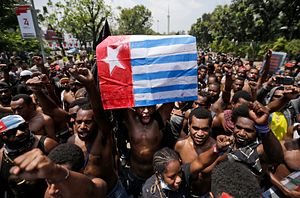At least six protesters and one soldier have been killed during clashes in Indonesia’s Papua and West Papua province since unrest began over a two weeks ago.
The Indonesian government dismissed the report of protesters being killed as “a provocation,” but said one soldier had been killed and three police officers injured.
A local news outlet, Suara Papua, first reported the protesters’ deaths last Wednesday. That same day, Al Jazeera also reported the deaths, quoting locals who say they witnessed the killings. The following morning, the Australian Broadcasting Corporation (ABC) reported on the killings, but said at least two, not six, protesters had been killed.
Such reports have been difficult to verify as Indonesia rarely allows foreign media access to West Papua. Information coming from the region is also sparse as an internet blackout remains in place.
On Monday, however, a video emerged of police-backed armed militias firing on peaceful protesters in their student dormitories. It has been confirmed that one student was killed in the attack and two others were shot. In another video that circulated, Indonesian soldiers can be seen giving orders to Indonesian vigilante groups, who Papuan protesters allege are being encouraged by security forces to attack Papuans.
The protests began on the August 17, Indonesian Independence Day, when reports of police brutality against a group of Papuan students in the province of East Java began circulating on social media. Responding to allegations that a group of students had torn down an Indonesian flag before retreating into a dormitory, police fired tear gas into the building and arrested 43 students as angry mobs gathered outside the dorm and reportedly chanted racist anti-Papuan slogans.
The students were released after questioning, with Governor of East Java Khofifah Indar Parawansa apologizing for the behavior of the mob, saying it “does not represent the voice of the people of East Java.”
Nonetheless, in West Papua and Papua, often referred to collectively as West Papua, thousands of people had already taken to the streets to protest against the racist remarks made toward the students.
Amid clashes with police and military personnel, protesters set fire to a legislative council building and blocked major roads in the provincial capital, Manokwari. In the city of Fakfak, local media reported that protesters had set a market ablaze and destroyed ATMs and shops. Several buildings were also destroyed in the city of Jayapura. In Jakarta, the capital of Indonesia, protesters flew the banned Morning Star flag in front of the state palace.
Indonesian President Joko Widodo appealed for calm in the region and said he would invite prominent Papuans to his palace in the wake of the protests, but defended the internet blackout, saying it was done for the sake of the national interest.
A few days after protests began, Indonesia deployed more than 1,000 security personnel to quell the unrest. This was expected to inflame the situation, as the military has often used violence to disperse protests in the past.
Since Indonesia’s acquisition of the territory over 60 years ago, the military has waged a ruthless campaign against the pro-independence movement known as Free Papua. While there are a few thousand armed members of the movement, it’s the civilians who have felt the brunt of the conflict. Due to the lack of media presence exact figures are unknown, but rough estimates put the civilian casualties between 200,000 and 450,000.
In a report published just last year, Amnesty International said over the two decades since Indonesia’s reforms began, Amnesty has continued to receive allegations of unlawful killings by security forces in the provinces of Papua and West Papua, even as they declined across Indonesia.
The director of Amnesty International Indonesia, Usman Hamid, said that despite over 20 years of democratic reform and progress on human rights in Indonesia, Papua seems to be an exception.
The West Papuan conflict has existed since 1969, after the Indonesian military took over control of the territory from the Dutch following an independence vote called the Act of Free Choice.
Despite the United Nations overseeing the vote, the Indonesian military handpicked 1,026 people to participate on behalf of the entire population and threatened to kill them and their families if they voted the wrong way.
Almost all indigenous Papuans reject the referendum to this day, and those who agitate for independence openly do so at a high personal cost. In Indonesia, protesters can be imprisoned for up to 15 years for simply raising the Morning Star flag. Indonesia’s neighbors have also faced severe diplomatic pressure from the Indonesian government for simply receiving Papuan refugees.
In January, Benny Wenda, an exiled West Papuan independence leader, delivered a petition signed by more than 1.8 million people calling for an independence referendum to the United Nations human rights chief Michelle Bachelet.
At the Pacific Islands Forum last month, the Pacific bloc called on Indonesia to finalize a long-promised visit to the Papuan provinces by Bachelet. The forum has asked for a report on alleged human rights abuses in the region within a year.

































